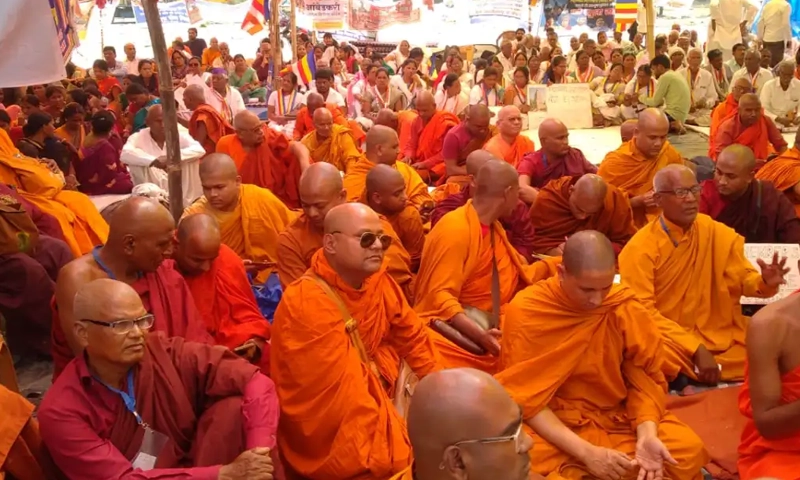- Web Desk
- 4 Hours ago

Protests erupt at Buddhism’s holiest site over Hindu control of sacred temple
-
- Web Desk
- Mar 25, 2025

BODH GAYA, INDIA: In Bodh Gaya, a town in Bihar, India, known as the birthplace of Buddha’s enlightenment, Buddhist protests are gaining momentum after police forcibly removed monks from the Mahabodhi Temple. The demonstrations are fueled by a long-standing demand from Buddhists to take full control of the temple, one of their most sacred sites.
Abhishek Bauddh, a 30-year-old Buddhist from Chhattisgarh, has been visiting Bodh Gaya since his teenage years. Standing in line for breakfast among fellow protesters, he said, “This is unlike anything I’ve seen before. Buddhists from all over India have gathered, not just for a pilgrimage but to make a stand for our rights.”
According to Al Jazeera, the protests centred around the management of the Mahabodhi Temple, which has been overseen by a mixed committee of Hindus and Buddhists since 1949, following the Bodh Gaya Temple Act. However, several Buddhists are upset about the influx of Hindu monks in the temple’s leadership. They say the rituals done by the Hindus are contrary to those in Buddhism, and they want things to be changed. Protests organized by the All-India Buddhist Forum (AIBF) have appeared across the country. Buddhists have traveled as far north as Ladakh and as far south as Mysuru to protest in Bodh Gaya. Akash Lama, general secretary of AIBF, says more and more people are joining the cause. “Buddhists are coming here in large numbers because we believe the time for change has to come,” he said.
Also read: China hopes Dalai Lama can ‘return to right path’, his team rejects preconditions
The Mahabodhi Temple is not only a UNESCO World Heritage Site but also holds immense spiritual significance as the place where the Buddha reached enlightenment. Nonetheless, the site has been a site of controversy for a long time. The Bodh Gaya Math, a Hindu monastery that performs the rituals at the site, claims that for centuries they have been keeping the temple together. Many Buddhists feel differently, believing that Hindu involvement in the administration of the temple reduces its Buddhist identity. This is a concern particularly for those who bring up the fact that the Buddha expressly rejected the Vedic rituals, which are central to Hinduism.
Tensions reached a peak in February 2025 when more than two dozen Buddhist monks who had been on a hunger strike for 14 days were forcibly removed by police. Pragya Mitra Bodh, one of the protesters, asked, “Why can’t we protest in a place that belongs to us?” Protesters are demanding that the Bodh Gaya Temple Act be repealed so that full control of the temple can be handed over to the Buddhist community.
Protests have rekindled long-held grievances related to the temple’s changing control. The temple, which was built by Emperor Ashoka in the 3rd century BCE, fell into disrepair and neglect, particularly after the 13th century when the influence of the Buddhist faith began to decline due to invasions. By the late 16th century, a Hindu monk, Ghamandi Giri, took control of the temple and established the Bodh Gaya Math, which has been in charge ever since. Efforts to regain Buddhist control of the site began in the 19th century, culminating in the passage of the Bodh Gaya Temple Act in 1949, which established the current management structure. But many Buddhists argue that despite the law, Hindu control over the temple is still too strong.
Swami Vivekananda Giri, the current head of the Bodh Gaya Math, has dismissed the protests as politically motivated, especially with upcoming state elections. He insists that the Math has always welcomed Buddhists and that it treats Lord Buddha as a reincarnation of the Hindu god Vishnu. “We have always considered Buddhists our brothers,” Giri said. He also argued that if the Act were repealed, the temple would belong entirely to Hindus, as it did before the law was passed.
Despite facing various challenges, the protesters maintain a sense of optimism. Akash Lama, the protest leader, voiced disappointment in the government and their lack of response but stressed the solidarity of the Buddhist community. “The government is not listening, but we are not going to stop advocating for our rights,” he explains. Abhishek Bauddh, too, thinks their protest will make a difference if they broadcast their message together. “It is our unity that gives strength to our message,” he said, feeling that their demonstration will create change in the future.






